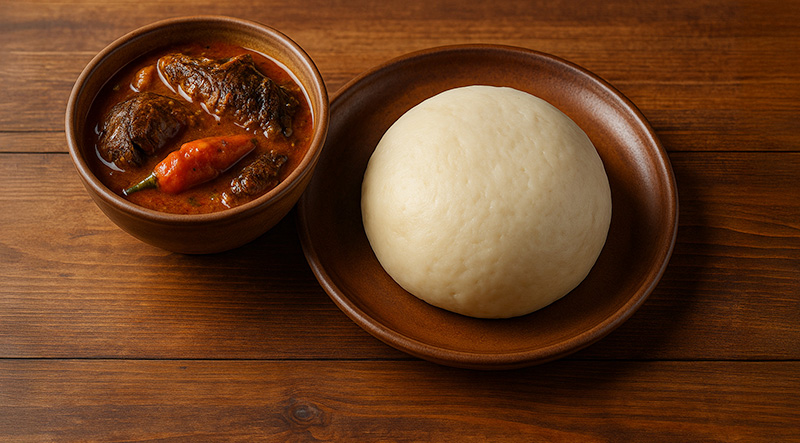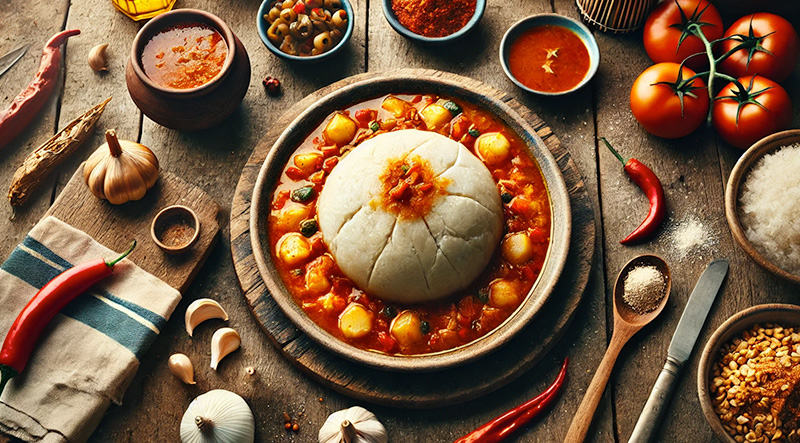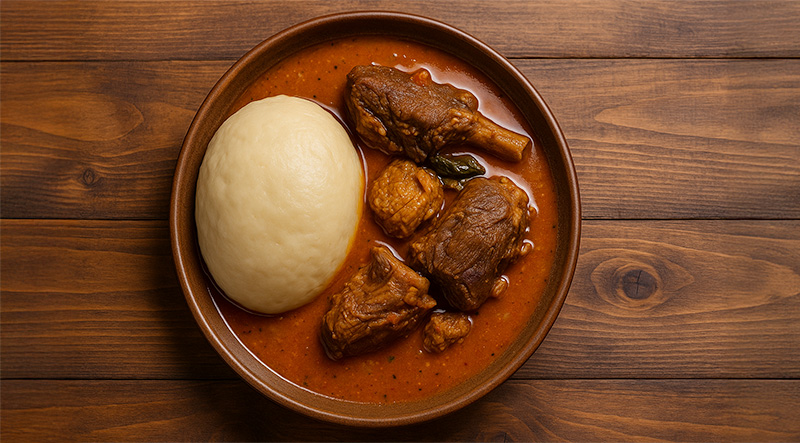Dumboy, Liberia's most famous comfort food, is soul-satisfying, stretchy, and smooth. It is a proudly served national treasure. Dumboy, which is made by pounding freshly boiled cassava into a thick, elastic dough, is typically eaten with peppery fish sauces or rich, spicy stews like palm butter soup. Each bite is a delectable balance of taste and tradition thanks to its soft, slightly sticky texture, which is ideal for scooping up strong, flavorful broths. Dumboy is more than just food; it's a taste of Liberia's history in every filling bite, whether it's consumed during festive events or peaceful family dinners. Read More...
The History of Liberia’s National Dish – Dumboy (Pounded Cassava Balls):
In the vibrant culinary landscape of West Africa, Dumboy stands tall as a cherished national dish of Liberia — a food not only rooted in nourishment but woven into the very fabric of Liberian identity and tradition. This thick, starchy ball of pounded cassava is more than just a staple on the plate; it’s a cultural symbol, a source of comfort, and a centerpiece in Liberian homes, gatherings, and ceremonies.
Origins in the Land of Cassava:
The history of Dumboy begins with cassava, a drought-resistant root crop introduced to Africa from South America during the 16th century by Portuguese traders. Over time, cassava flourished across West Africa due to its adaptability to different climates and soils — and Liberia, with its tropical environment, quickly embraced it as a vital food source.
Cassava became especially prominent in Liberia during the 19th century, when freed African Americans settled in the region and began cultivating it alongside local communities. However, the preparation of Dumboy is uniquely indigenous, reflecting traditional African cooking methods of pounding and hand-shaping food, much like fufu or banku in neighboring countries.
A Dish Defined by Ritual and Strength:
To make Dumboy, cassava is boiled until soft, then pounded vigorously in a large wooden mortar using a heavy pestle. The process requires rhythm, strength, and teamwork, often involving multiple family members who take turns or work in unison — one of the reasons Dumboy is deeply associated with community and celebration.
The pounding transforms the cassava into a smooth, elastic dough, which is then rolled into soft balls and served hot, usually with a flavorful sauce such as Palm Butter Soup, bitterleaf stew, or spicy fish gravy. Traditionally, Dumboy is eaten by hand, using the fingers to scoop and dip into the accompanying soup.
Cultural Significance in Liberia:
Dumboy is more than a culinary choice — it’s a dish of belonging. It’s a staple at weddings, funerals, national holidays, and Sunday family dinners. In rural and urban areas alike, the smell of boiled cassava and the rhythmic pounding in courtyards signal that something special is being prepared.
In a country where cassava is both plentiful and economical, Dumboy is a unifier — a dish that transcends social and economic lines. It’s also a dish of pride, often highlighted by Liberians abroad as a defining taste of home.
From Village to Diaspora:
As Liberians have migrated around the world, they have taken Dumboy with them, adapting the recipe to modern kitchens. While the traditional mortar and pestle are hard to find in Western homes, some cooks use food processors or stand mixers to replicate the pounding process — a testament to the dish’s adaptability and enduring importance.
Restaurants in the Liberian diaspora continue to serve Dumboy as a cultural centerpiece, offering newcomers a taste of Liberia’s rich culinary soul.
A Legacy Preserved:
Dumboy is more than just pounded cassava — it is a dish of history, heritage, and heart. It speaks to the resilience of Liberian communities, their deep agricultural roots, and the unbreakable bond between food and identity. Whether served from a village pot or plated in a modern city kitchen, Dumboy remains a symbol of Liberia’s past, present, and future — one hearty, hand-shaped bite at a time.
Prepare the Cassava:

Boil the Cassava:
Pound the Cassava:

Shape the Dumboy:
Serve:

Tips & Notes:
The total preparation and cooking time for Dumboy with Palm Butter Soup is approximately 1 hour to 1 hour and 15 minutes. Preparing and peeling the cassava takes about 10–15 minutes, followed by 25–30 minutes of boiling until the cassava is tender enough for pounding. The pounding process itself, whether done traditionally or with a mixer, takes another 10–15 minutes. Meanwhile, the Palm Butter Soup can be prepared in parallel and typically requires 30–45 minutes, depending on the type of meat, fish, or vegetables used. Altogether, with multitasking, the full dish can be ready in just over an hour.
A single serving of Dumboy with Palm Butter Soup contains approximately 450–600 calories, depending on the portion size and ingredients used in the soup. The Dumboy itself, made from boiled and pounded cassava, contributes around 200–300 calories per serving, primarily from carbohydrates. The Palm Butter Soup, rich with palm nut extract and typically prepared with meats, smoked fish, and oil, adds another 250–300 calories, largely from fats and proteins. If additional ingredients like rice, peanut butter, or extra oil are included, the calorie count may be higher. Overall, it’s a hearty and energy-dense traditional Liberian meal.



